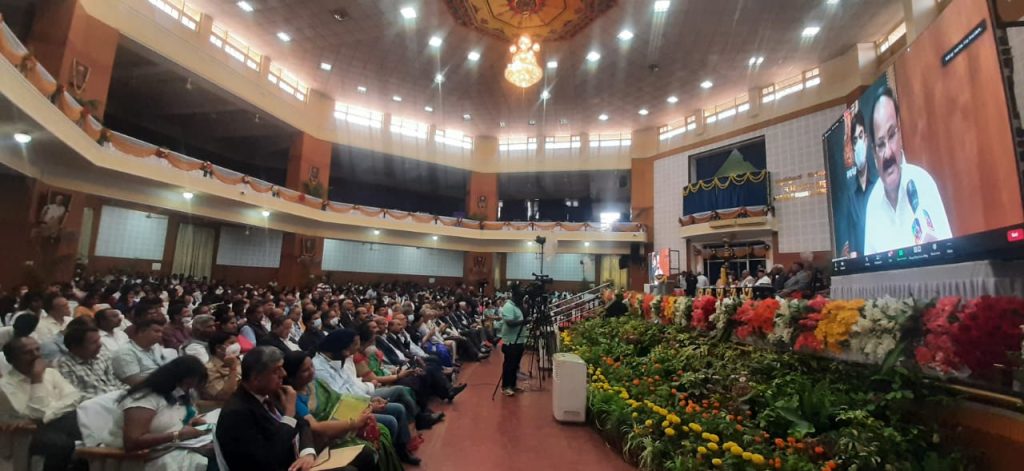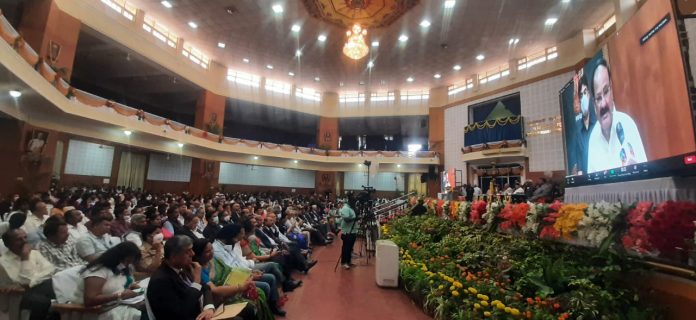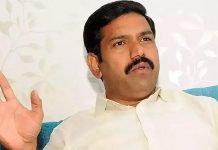Mysuru, March 23, 2022 (www.justkannada.in): “The higher educational institutions of the country have a vital role to play in accomplishing the Sustainable Development Goals set by the United Nations and its 2030 agenda,” observed Hon’ble Vice-President of India, Sri Venkaiah Naidu.
He inaugurated the 96th Annual Conference and Universities Vice-Chancellors’ Conference, jointly organized by the Association of Indian Universities, New Delhi and the University of Mysore.

In his address, he said, “the recent United Nations report indicate that the progress achieved in this goals is uneven and more needs to be done. According to the 2021 report, the three countries Finland, Sweden and Denmark top the list. Countries like Australia, Germany, UK and Spain are in the top 20 and in the list India is in the 120th position. This is a matter that has to be taken seriously. We must remember the fact that saving the planet has to be a collective effort of all the countries. We can ill-afford to lose sight of the relevance of the adage ‘Vasudaiva Kutumbakam’ in this context. India is the 2nd largest populated country in the world. It is one of the critical countries where achievement of the sustainable development goals will be essential to realise the 2030 agenda in the next decade. Poverty, illiteracy are the major challenges we need to surmount as a society in our quest to achieve sustainable development goals. Other factors which are hindering our march towards the progress are malnutrition, gender inequality, equitable access to safe water, and environmental pollution. Thus there is a long road ahead that needs to be travelled to achieve the SDG agenda 2030.

Further, he said, the NEP-2020 is a foresighted document which is bound to transform the educational landscape of our country. Its recommendations are aligned with the SDGs, and its scope and vision encompasses overall Indian educational system from pre-primary to higher education, along with curriculum to institutions reforms in a phased manner. We need to completely overhaul our educational system. I am certain, that implementation of this NEP in letter and spirit will help us to achieve the SDG agenda.

Vice-President Venkaiah Naidu’s speech content :
It is my pleasure to address such a designated galaxy of intellectuals who are the academic captains of our country. I was informed that along with the Vice-Chancellors the executive heads of apex bodies in higher education and senior academic faculty of Indian Universities have also congregated to discuss and deliberate on crucial issues like sustainable development roles in this meet. Before I share my views let me compliment each one of you for being part of this meet organised by the association of Indian Universities.
It is heartening to note that this prestigious orgnaisation is one of the oldest flagship bodies of universities in the world. It is also a matter of delight that stalwarts like Dr. Shyam Prasad Mukherjee, Dr. Sarvepalli Radhakrishnan, Dr. Zakir Hussain, Dr. A.L. Mudaliar and many more eminent educationists and astute statesmen had owned this organisation as Presidents. Today, when you are celebrating its 96th Foundation day I deem it an honour to address you all, on how the Indian Education Institutions can play a vital role in realising the sustainable development goals set by the United Nations. You are all aware, that the United Nations has set the sustainable development goals, comprising 17 sustainable development goals, which was signed by most countries more than 7 years ago. The recent United Nations report indicate that the progress achieved in this goals is uneven and more needs to be done. According to the 2021 report, the three NODEE countries Finland, Sweden and Denmark top the list. Countries like Australia, Germany, UK and Spain are in the top 20 and in the list India is in the 120th position. This is a matter that has to be taken seriously. We must remember the fact that saving the planet has to be a collective effort of all the countries. We can ill-afford to lose sight of the relevance of the adage ‘Vasudaiva Kutumbakam’ in this context. India is the 2nd largest populated country in the world. It is one of the critical countries where achievement of the sustainable development goals will be essential to realise the 2030 agenda in the next decade. Poverty, illiteracy are the major challenges we need to surmount as a society in our quest to achieve sustainable development goals. Other factors which are hindering our march towards the progress are malnutrition, gender inequality, equitable access to safe water, and environmental pollution. Thus there is a long road ahead that needs to be travelled to achieve the SDG agenda 2030.
The Niti Ayog has created a national framework to work towards achieving these goals. The Ministry of Statistics and Program Implementation is assisting Niti Ayog, interacting with other Ministries and developing indicators on SDG goals and targets. As is evident achieving these goals is not the responsibility of any particular organisation, Ministry of Government. It needs a concerted effort from all stakeholders, including the civil society, industries, NGOs, and most importantly our educational institutions. The contribution of educational institutions is of critical importance. Primary, Secondary and Higher Educational Institutions need to consciously adopt practices that need to the achievement of SDGs. Colleges and Universities have a bigger role to play in this regard. It is a key factor in achieving these goals. They can contribute in a number of ways such as research, policy development and engagement with societies for creating awareness and effective implementation of sustainable development strategies, apart from preparing students for the challenges of 21st century.
You all are aware India’s higher education sector is the 3rd largest in the world. This throbbing educational hub with around 1050 universities, more than 10,000 professional technical institutes and 42,343 colleges in both public and private sectors. If all our higher educational institutions come forward to contribute towards accomplishment of these goals our achievement will be very significant and it would make a major impact on overall scenario. Unfortunately, so far most of the higher educational institutions have remained almost disconnected in the SDG agenda 2030. When it comes to integration of the SDGs the operation of higher educational institutions still have a long way to go.
I congratulate the Association of the Indian Universities and its president Dr. Tiruvasagam and other members for taking this initiative in conducting these brainstorming sessions in this seminar towards realising these SDG goals.
My dear Vice-Chancellors and distinguished educational gurus, you are all aware that India has a glorious past, knowledge generation, application and dissemination to the world. The existence of Universities like Nalanda, Takshashila, Vikramshila, Valladhi and Vadahanpuri in ancient India, were ample testimony to the fact that India had an grand education, making India the Vishwaguru at one time. The essence of the ancient knowledge systems of India in the form of Vedas and Upanishads, Puranas, Itihas, among others. The greatness of Indian culture and traditional lifestyle of Indians have been passed on from generation to generation till today. The versatility of knowledge systems, and culture and their significance make them relevant forever. For example: Sarvebhavantu Sukhinaha, which is a popular prayer, which means to keep all beings happy, will be a everlasting wish of all individuals and our society
Today, India stands poised on the threshold of a world of historic responsibilities and opportunities. It is now emerging as one of the super powers with improved education and development of resources and jobs, better infrastructure, and healthcare among others.
The NEP-2020 is a foresighted document which is bound to transform the educational landscape of our country. Its recommendations are aligned with the SDGs, and its scope and vision encompasses overall Indian educational system from pre-primary to higher education, along with curriculum to institutions reforms in a phased manner. We need to completely overhaul our educational system. I am certain, that implementation of this NEP in letter and spirit will help us to achieve the SDG agenda.
I understand there will be a discussion on all the SDGs in various sessions which will primarily address the role of the Colleges and Universities, in giving an impetus in the larger objective of accomplishing the SDGs. Exchange of ideas, knowing from others experience, that is very vital. It is very important to share knowledge, highlight success stories and good practices. At the same time it is also important to identify areas of concern and challenges, and suggest the way forward in terms of action for the higher education institutions, government and other stakeholders.
It is my dream to see the Indian Universities rank among the top 10 universities of the world. That is the wish of the people of India too. All universities should set higher standards and academic excellence including research, knowledge creation and focus on infrastructure development while ensuring equitable access to education.
Keywords: University of Mysore- Association of Indian Universities- Conference- Vice-President Venkaiah Naidu.









